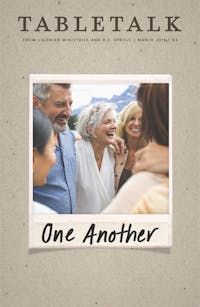
Request your free, three-month trial to Tabletalk magazine. You’ll receive the print issue monthly and gain immediate digital access to decades of archives. This trial is risk-free. No credit card required.
Try Tabletalk NowAlready receive Tabletalk magazine every month?
Verify your email address to gain unlimited access.
The love language of all marriages is self-denial. When both husband and wife are consumed not with their own immediate happiness but with the happiness of one another, they will enjoy a happy marriage. The same is true for enduring friendships and for authentic community.
With the disintegration of marriage has come the dissolution of community. As such, community has fallen on hard times. What every generation in every society in all of history has enjoyed, the rising generation will have to fight for. With the rise of online communities, online church, and online everything, face-to-face, eye-to-eye, shoulder-to-shoulder community has become increasingly difficult to find. Moreover, many don’t know what real community is and thus don’t know what to look for. Real community doesn’t happen on its own—it takes time, patience, repentance, forgiveness, and love that covers a multitude of sins. The church community is not just a crowd of people on a Sunday morning; it is the gathered, worshiping people of God in a congregation where masks aren’t needed and where real friends help bear the real burdens of one another. Community is not just getting together; it is living together, suffering together, rejoicing together, and dying together.
Although many Christians claim to want genuine community, many want it only on their own terms, when it’s convenient, and when it demands nothing from them. What they want isn’t the church community, but a country club where they pay their dues for services rendered. They want to be served without having to serve anyone else. Real community forces us to die to ourselves and get over ourselves so that we might love one another as ourselves. Francis Schaeffer observed that “the early church practiced two things simultaneously: orthodoxy of doctrine and orthodoxy of visible community.” Such orthodoxy of visible community is grounded in the “one another” passages of Scripture, which provide us with the essential elements of authentic community. They strike at the root of our self-centeredness, and they lead us to take our eyes off ourselves and to deny ourselves so that we might love one another, encourage one another, confess our sins to one another, forgive one another, and not slander one another, gossip about one another, devour one another, or envy one another. In so doing, our Father in heaven is glorified as we manifest the beauty of the gospel of Christ through the power of the Spirit, who has united a bunch of repentant sinners like us.
